Leaders strive for unity
Nashville, Tenn. | Ethics and Religious Liberty Commission President Russell Moore and his entity’s executive board released a statement March 20 seeking unity amid recent debate in the Southern Baptist Convention.




Moore, who has served as the ERLC’s president since 2013, has drawn criticism for comments he made during the 2016 presidential campaign and for his support of a New Jersey Islamic group’s efforts to build a mosque.
In the statement, the ERLC’s executive board (comprised of six of the entity’s 34 trustees) expressed their support for Moore and how he has followed up on tension caused by his campaign comments opposing then-candidate Donald Trump.




 By Jason K. Allen
By Jason K. Allen


Illinois
Nonprofit Organization U.S. POSTAGE PAID Peoria, Illinois Permit No. 325 Visit our new website IllinoisBaptist.org See page 3 for more addresses. IB The crowd was right, for once Table Talk with Doug Munton P. 13 APRIL 10, 2017 Vol. 111 No. 05 News journal of the Illinois Baptist State
Baptist
Association
SBC news
after ERLC tensions P. 3 IBSA BOARD REPORT Facilities upgrades cited New control of BCHFS properties proposed P. 5 RELIGIOUS LIBERTY State senate bill withdrawn After clergy objections P. 4 REPORTER’S NOTEBOOK Protecting children When pastoral concerns and rights conflict P. 12 MOORE GOD-GIVEN INFLUENCE: Ministers’ wives learn to leverage their position P. 6 Bold Strokes A Surrendered Life A special section on ministry, calling, and education, starting on page 7 Reformation @ 500 Links to the past P. 13
Helping young people make vocational choices
Moore issues statement
Plus:
CONVENTIONAL WISDOM
Snapshots from the world of Illinois Baptists
What makes a good pastor?
Barna Research measured the top traits of good pastors identified by U.S. adults, and pastors themselves. A slight majority of pastors chose “other.”
“Given an opportunity to write in, pastors offer a wide variety of traits they believe are essential for their work. The most common themes that emerge from their answers include humility, consistent spiritual disciplines (especially prayer), patience, compassion, flexibility, integrity, a clear ministry calling, and good communication and listening skills.” – Barna Research
– 2017 State of Pastors report, Barna
Budget Goal: $1,575,000
$1,352,098
The Illinois Baptist staff
Editor - Eric Reed
Graphic Designer - Kris Kell
Contributing Editor - Lisa Sergent
Editorial Contributor - Meredith Flynn
The general telephone number for IBSA is (217) 786-2600. For questions about subscriptions, articles, or upcoming events, contact the Illinois Baptist at (217) 391-3119 or IllinoisBaptist@IBSA.org

The Illinois Baptist is seeking news from IBSA churches. E-mail us at IllinoisBaptist@IBSA.org to tell us about special events and new ministry staff.

POSTMASTER: The Illinois Baptist is owned and published every three weeks by the Illinois Baptist State Association, 3085 Stevenson Drive, Springfield, Illinois 62703-4440. Subscriptions are free to Illinois Baptists. Subscribe online at IBSA.org
 NATE ADAMS
NATE ADAMS
A matter of life and death
Several years ago, my father died on the first of April, just a few days before Easter. And so each year now, April and Easter roll in and bring me an emotional mixture of grief yet hope, sadness yet joy. At this time of year, I acutely feel both the promise of life, and the inevitability of death.
When I returned home from my dad’s funeral, the church I was serving as interim pastor sensitively asked if I would be ready to preach as soon as Easter Sunday. I assured them I wanted to. I believed, deeply, in resurrection and eternal life, and I was eager to declare that boldly from the pulpit, both for the congregation and for myself. I wanted to publicly join the Apostle Paul in defiantly asking death where its victory and sting are, now that Jesus has conquered it.
But I was also still feeling immersed in the reality and pain of my dad’s death, and my sermon outline showed it. My first three points were simple, and somber. Death is definite. Death is designed. Death is difficult. I preached those first three points through the misty eyes of fresh grief.
Of course, I was working my way to a fourth point, and a hope-filled conclusion. Yes, death is definite, and designed, and difficult. But death is also defeated! I knew that to be the ultimate truth, the ultimate promise, the ultimate miracle. Yet during those painful days, it was as if I needed to admit those first three points as much as I needed the assurance of the fourth.
I needed to acknowledge, in fact to proclaim, the inescapability of death. Everyone needs to understand that everyone dies. I also needed to place the providential plan of death squarely at God’s feet. Because of our sin, it is God’s good and merciful design that everyone dies. And I needed, from my own deeply personal experience that year, to acknowledge how terribly painful death is, especially for those who lose someone they dearly love. If we do not have a sound theology of death, we will not have a sound theology of eternal life.
I learned that year that death is like a terrible, dark canvas, but a necessary one on which the story of resurrection and life can be brightly and beautifully painted. Without the reality and severity of death, the promise of resurrection and new life means very little. It is the depth, and finality, and “no exceptions” nature of our mortality that makes resurrected life so supremely valuable.
In other words, I had never valued Jesus’ resurrection more profoundly than when my dad died. The true victory and joy of Sunday is for those who have experienced the loss and despair of Friday.
So if you are entering April or Easter this year with a fresh experience of death, don’t be afraid to feel that pain deeply, with a holy grief. Only through death could Jesus remove the penalty of our sin. Only through death to our old selves can we be raised to a new and abundant life. And only through the death of our earthly bodies can we receive our new heavenly bodies.
As I learned 11 years ago in a profound new way, Easter is of necessity a matter of both life and death. But because of Jesus’ resurrection, we can stare death right in the face and ask where its victory and sting are. Death is simply a role player in the Easter story, a story that ends with the greatest victory in all of history—victory in Jesus.
Nate Adams is executive director of the Illinois Baptist State Association. Respond at IllinoisBaptist@IBSA.org.

2 IBSA. org Illinois Baptist the cooperative program Giving by IBSA churches as of 3/31/17 $1,417,531
to
2017
Received
date in 2016:
Goal: $6.3 Million
If I could get through this sermon, maybe, just maybe I’d find hope.
48% Love for people, desire to help people U.S. adults Pastors 30% 33% Love of God/Jesus 21% 22% Insight, wisdom, discernment 9% 15% Bible knowledge 5% 14% Faithfulness, obedience 10% 13% Cultural understanding 4% 13% Leadership, vision 16% 7% Zeal, passion, commitment 17% 6% Theological knowledge 2% 5% Team leadership 4% 3% Strategic thinking 2% 3% Other 54%
“We realize that divisions do not heal overnight, and as needs arise our board will be happy to address them,” the statement read. “But in terms of leadership and support, Dr. Moore is the man to whom it has been entrusted to lead this entity—speaking prophetically both to our culture and to our Convention. He will continue doing so with the confidence of our support.”
Curt Starner, a member of the ERLC’s larger trustee board, echoed those sentiments in comments to the Illinois Baptist

“Although I am not a member of the executive board of the ERLC, I believe that this statement was issued because the board believes that it is important for people to see that even when we disagree, we can be unified in purpose,” said Starner, pastor of Erven Avenue Baptist Church in Streator. “We may not always agree on the best way or ways to accomplish that purpose, but we can still work together to accomplish that purpose.
“People also need to know that the board supports Dr. Moore because we still believe he is the right man for the job.”
After the executive board’s introduction, the rest of the statement is from Moore, who apologized for seeming to direct criticism toward all Christians who supported Trump.
“I was asked often during the election about evangelicalism as it related to moral issues and character, and in so doing I spoke, often quite sharply, about those Christians who said or implied that such concerns don’t matter or shouldn’t be talked about,” Moore
said. “I was not, in so doing, intending to talk about Southern Baptists and others—and there were many—who were open about all of these issues but believed in supporting candidates, however flawed, who would appoint good people and carry out good policies on some issues. Again, I understand that, and find it reasonable and defensible, even when my own conscience differs.”
The ERLC’s statement was met with praise from SBC President Steve Gaines and Jack Graham, whose church, Prestonwood Baptist in Plano, Texas, announced earlier this year it would escrow $1 million in funds given through the Cooperative Program because of positions taken by the ERLC.
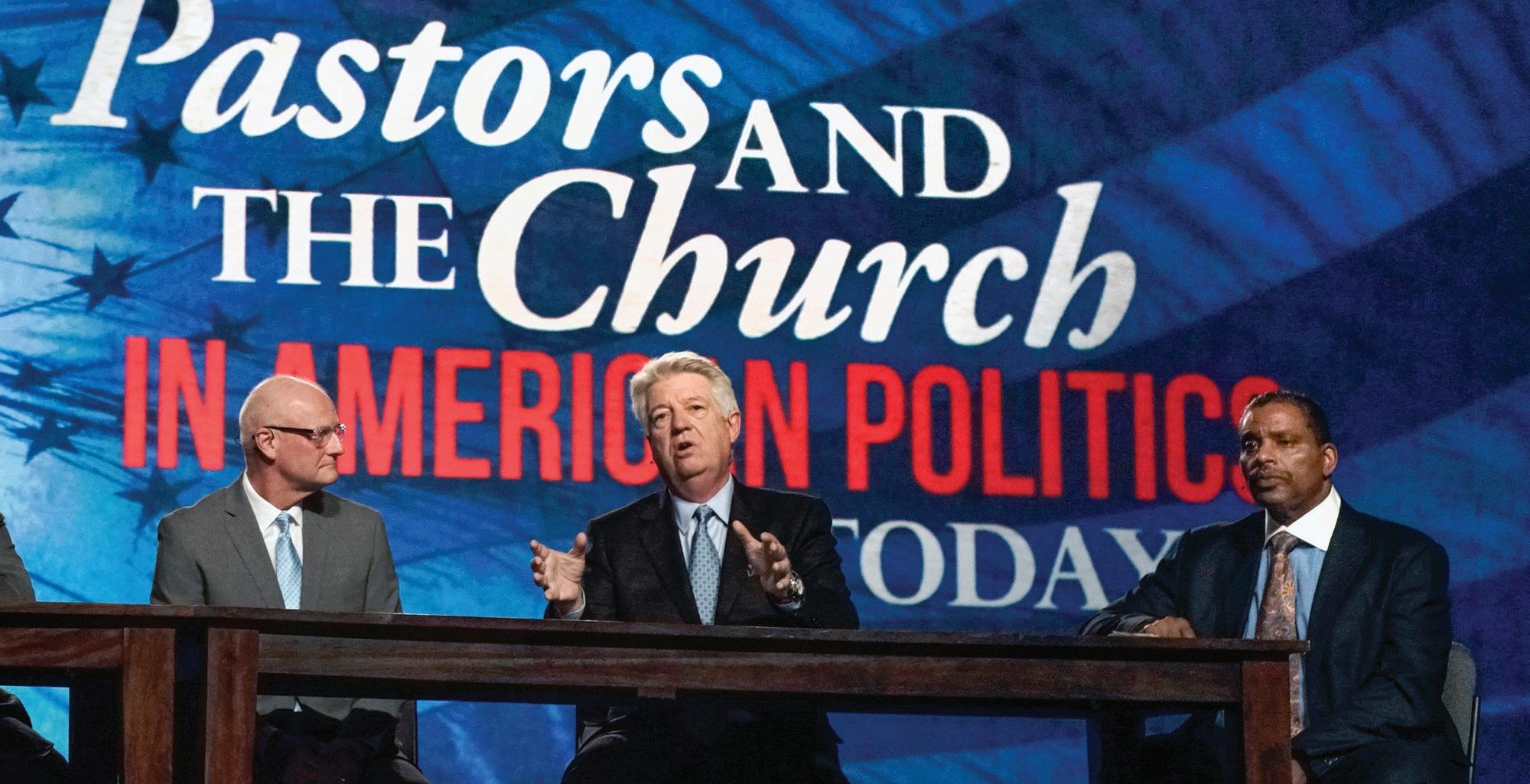
Graham tweeted a link to the ERLC’s unity statement, calling it “gracious and unifying.”




Much of Moore’s statement focused on working together despite differences of opinion. Starner agreed it is possible.
“My wife and I have four sons. Leading up to the primary, we were pulling for several different candidates,” Starner said. “Now, we all have the same president and we are all still part of the same family, living together in harmony. As Southern Baptists, we all live in the same house, so to speak.
“If we want to make an impact on this hellbound world, we better learn how to love one another and work together to further the Kingdom of God. That means that we have to be able to set aside many of our differences and desires for the sake of the Kingdom.”
– Meredith Flynn, with info from Baptist Press
Church mourns victims
After crash, ‘grief is real’

New Braunfels, Texas | The pastor of a church who lost 13 people in a bus crash told his congregation on the Sunday following the accident that it will take time, but they will heal together.

“It’s important for us to recognize this morning that our pain is real, our loss is real, our grief is real,” said Brad McLean, pastor of First Baptist Church, New Braunfels, according to a report by TV station KXAN. “And as a church family, we will have to work through these losses together.”
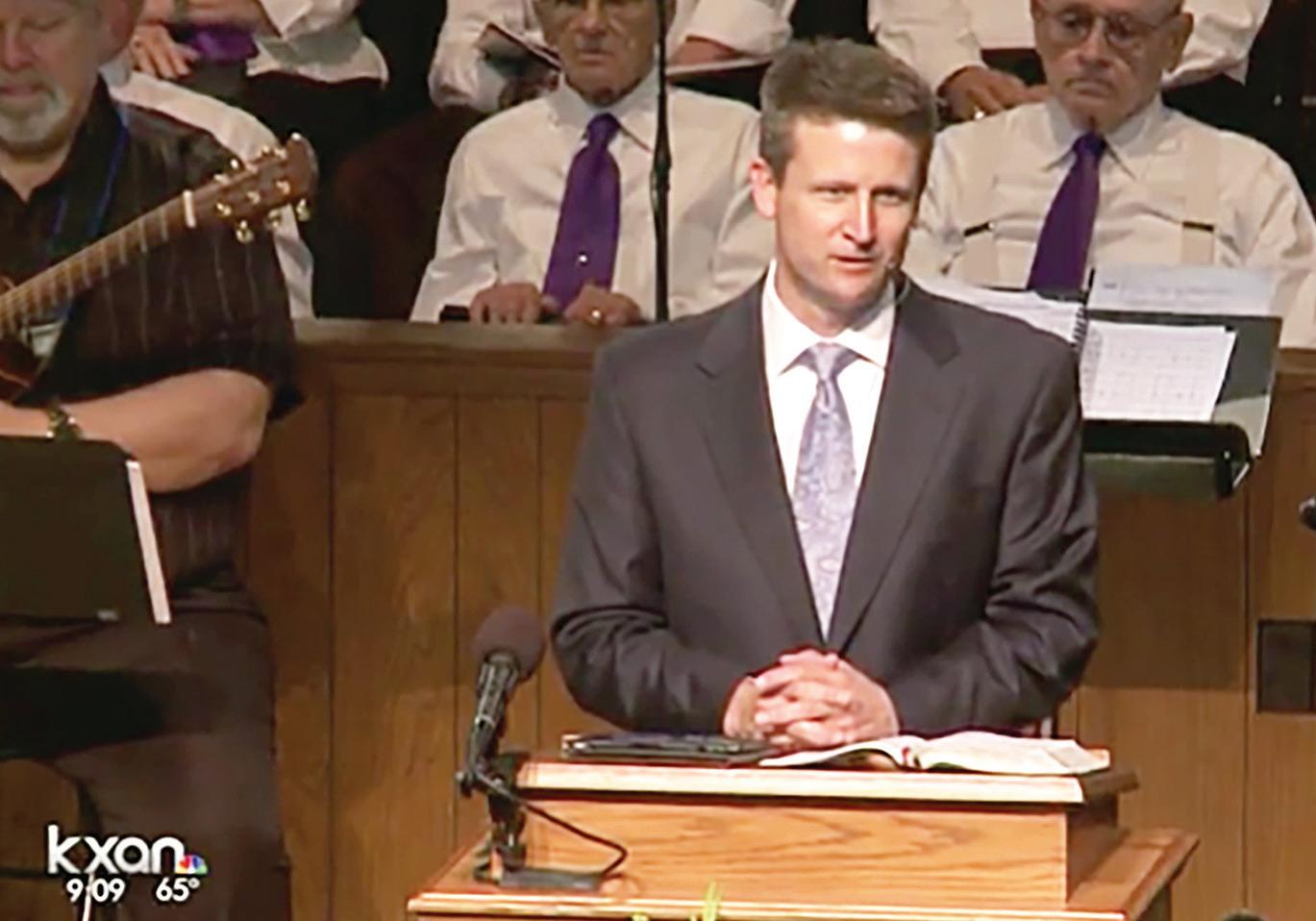
The April 2 worship service was just four days removed from the crash in Uvalde County, two hours from New Braunfels. The minibus was bringing members of the church’s senior choir back from a retreat when a pick-up crossed the center lane in a curve, state troopers said, and struck the bus head-on. All but one of the fatalities occurred at the site of the crash; the other, hours later at the hospital.
“It will take us a while as a church family to allow the Lord to begin to let us share in smiles, and laughs, and hugs, and those things we do enjoy as a church family,” McLean said during the church’s Sunday worship service. “And so it’s good for us to be together this morning, isn’t it?”
McLean and his staff are caring for the grieving families and the congregation that has an average Sunday worship attendance of 481, according to the Southern Baptists of Texas Convention. McLean told San Antonio TV station KENS5 that the church’s priority is to care for families who lost loved ones in the crash. To do so, the church has established a Tragedy Relief Fund on its website, fbcnb.org.
The Ticker facebook.com/illinoisBaptist twitter.com/illinoisBaptist
vimeo.com/IBSA IBSA.org www.ib2news.org Follow the latest Illinois Baptist news NEWS
pinterest.com/illinoisBaptist
IBSA. org 3 April 10, 2017 IllinoisBaptist.org IB
1 From the front: sbc leaders seek unity
Continued from page
– Info from KXAN, Baptist Press
THROUGH THE VALLEY – Pastor Brad McLean speaks to his Texas congregation during an April 2 worship service, just days after 13 people from the church were killed in a bus crash.
DIFFERENCES OF OPINION – Texas pastor Jack Graham (center) has said ERLC President Russell Moore’s comments during the 2016 presidential campaign expressed “disrespectfulness towards Southern Baptists and other evangelical leaders.” Graham (pictured at a panel discussion at the 2016 Southern Baptist Convention) leads Prestonwood Baptist Church, which announced earlier this year plans to escrow their Cooperative Program giving due to positions taken by the ERLC. BP photo
KXAN
Liberty to host Trump
Donald Trump’s first commencement address as U.S. president will be at Liberty University, the Christian institution whose president, Jerry Falwell, Jr. (right), was among the first evangelicals to publicly endorse him during the campaign.

Student reaction to the invitation was mixed, The Washington Post reported, with some expressing excitement and others joking on Twitter about skipping the ceremony. Trump previously spoke at Liberty’s Lynchburg, Va., campus in 2012 and 2016.
Princeton denies Keller
Princeton Theological Seminary announced March 22 it would reverse the decision to grant the Abraham Kuyper Prize for Excellence in Reformed Theology and Public Witness to Tim Keller (below), pastor of Redeemer Presbyterian Church in New York City. Seminary President Craig Barnes said the decision was made in order to “not imply any endorsement” of Keller’s “belief that women and [lesbian, gay, bisexual, transgender] persons should not be ordained.”

Training mandate withdrawn
Pastors objected to pending bill on First Amendment grounds
Springfield | Illinois Senate Bill 912, which would have mandated training in domestic violence reporting, will not move forward after scores of pastors objected. The bill had raised concerns regarding First Amendment rights and religious liberty.
Senate Bill 912, the Abused and Neglected Child Training Bill, would have required pastors to complete at least four hours of training to recognize signs of domestic violence against children and adults. According to Ralph Rivera, a lobbyist for the Illinois Family Institute, the bill’s sponsor, Senator Melinda Bush (D-Grayslake), is instead working on a resolution that would urge the Department of Children and Family Services (DCFS) to reach out to clergy and churches with an educational campaign on domestic abuse.
Rivera credited the change to “quite a number of pastors and citizens who contacted their senators urging them to oppose this government intrusion into the affairs of churches and religious liberties…For those who did contact their senators, this did do the job.”
Previously, the bill required, “…within one year of initial employment and at least every five years thereafter, any member of the clergy required to report child abuse as provided under the Act must complete mandated reporter training by a provider or agency with expertise in recognizing and reporting child abuse and domestic violence.”

Religious liberty advocates objected. “I believe this would set a precedent for government to require training of clergy,” Rivera told the Illinois Baptist after the requirement
was introduced. “It is important to know that once a precedent is set, the next government requirement is easier to do. We don’t want to go down this road.”
The Illinois Abused and Neglected Child Reporting Act already requires clergy, physicians, teachers, and others to report suspected abuse, noted Bob Vanden Bosch, executive director of Concerned Christian Ministries. “As the law stands now, all pastors are mandated reporters of sexual child abuse. The code of confidentiality is still intact, so information that is found out in a confessional nature is not required to be reported. It has been discovered in other states that when any confidential source is removed, it is less likely that child molesters will come to confess their sin so something can be done to protect the child in question. If a pastor hears of child sexual molestation from a third party, rather than in a confessional nature, they are mandated to report that.”
– Lisa Sergent
Related: How pastors can police themselves, page 12
The seminary, which is associated with the Presbyterian Church U.S.A., said it would not give the Kuyper award this year, but still planned to host the prize’s annual lecture—given this year by Keller—on April 6. Keller founded Redeemer in 1989 and has since led the church to grow to three campuses in Manhattan. Earlier this year, he announced his plans to step down as senior pastor, effective July 1. He will continue to lead a church planting movement in New York City.
Genderless in Portland
Video game designer Patrick Abbatiello became the first known American to legally gain the designation of “genderless” when an Oregon judge granted the request March 10. Multnomah County Circuit Court Judge Amy Holmes Hehn also granted the Portland resident, 27, a name change to “Patch.”
“Even gender-neutral pronouns don’t feel as if they fit me,” Patch told NBC News. “I feel no identity or closeness with any pronouns I’ve come across. What describes me is my name.”
– The Washington Post, Baptist Press, NBC News
Get breaking news in The Briefing online, posted every Tuesday at www.ib2news.org.
States can defund Planned Parenthood
Washington, D.C. | Vice President Mike Pence cast the deciding vote in the U.S. Senate March 30 to allow states to deny funding to Planned Parenthood.
The vote overturned a rule established by former President Barack Obama that kept states from holding back Title X fund ing, which has traditionally been used by the federal government to support organizations that provide family planning. Funds from the Title X Family Planning Program, established by President Richard Nixon in 1970, are awarded directly through the federal government, or as grants to individual states, who then choose which organizations will receive them.
Some states choose to direct funding away from organizations that provide abortions, WORLD magazine reported after the recent vote. Which is why President Obama directed the Department of Health and Human Services not to allow states to deny the Title
X funding to Planned Parenthood, said Sen. Joni Ernst (R-Iowa), who introduced the resolution in the Senate.

“Why was this rule implemented in the first place? It’s because the Obama administration wanted to do everything it could to secure federal funding streams for Planned Parenthood before they turned over the keys to the Trump administration. With our vote today we prevented that from happening.”
The U.S. House of Representatives overturned President Obama’s rule Feb. 16, but the vote reached a stalemate in the Senate when two Republicans—Susan Collins of Maine and Lisa Murkowski of Alaska—voted with Senate Democrats. Pence broke the tie with his vote.
National Public Radio reported in 2011 that 25% of all Title X funds go to Planned Parenthood and its affiliates.
– Info from WORLD
4 IBSA. org Illinois Baptist
the briefing
Capitol Watch
Pulpitandpen.org
IBSA board
Property decisions and renovations reported
Springfield | The March 28 meeting of the Illinois Baptist State Association (IBSA) Board of Directors was a celebration of ministry being done through the lands and facilities of the Association around Illinois.

Denny Hydrick, executive director of Baptist Children’s Home and Family Services (BCHFS), reported that the agency will celebrate 100 years of service in 2018. He shared how in 1918, 20 families pooled together $3,000 to buy 40 acres of land in Carmi that they gave to IBSA for an orphanage to be established.
Hydrick, accompanied by recently retired BCHFS Executive Director Doug Devore, told the board how from those original 40 acres, BCHFS now manages 744 acres, all of which is titled to IBSA. The 80 acres Angels’ Cove sits on is jointly deeded to IBSA and BCHFS. However, liability insurance, taxes, and upkeep are provided by BCHFS. If any type of litigation were to occur, the lawsuit would include IBSA due to its property ownership. These factors and changes to the IBSA Constitution in 2014 caused the BCHFS Board of Trustees to recommend to the IBSA Board that it transfer ownership of property to BCHFS. After some discussion, the board approved the recommendation. It will be presented to messengers for a vote at the November IBSA Annual Meeting at Tabernacle Baptist Church in Decatur.
IBSA Executive Director Nate Adams gave much of his report time over to Associate Executive Directors Mark Emerson and Pat Pajak. Emerson shared about investments being made in Streator Baptist Camp, including dining hall renovations with new tables and chairs, siding on the outside of the hall, and gutting a bunkhouse. A guest kitchen was also added. “Much of the work has happened with mission teams,” he noted. Under new leadership of Camp Manager Mike Young, the Streator facility is almost fully booked this summer.
The BASIC student ministry house on the campus of the University of Illinois at
Urbana is currently under renovation and new leadership. Emerson told the board the house is currently being renovated with new flooring and paint on the main floor, and an overhaul of the kitchen and main floor bathroom. “God has given us a new tool right in the midst of the 44,000 people who attend the school,” he said.
IBSA Associate Executive Director Pat Pajak assumed a new assignment in February. He is developing a network of pastors and churches to lead in evangelism in Illinois. He told the board about a key weekend in his decision to take on the evangelism role. He shared with friend how to lead a hospitalized man to Christ, which the friend did an hour before the man died; Pajak himself led a man to Christ at the mall that same afternoon; and then his pastor challenged him with a timely sermon.
“God sometimes leads us in ways we don’t expect at all…and that Sunday morning, I surrendered to lead the evangelism work in Illinois,” Pajak said through tears. Pajak previously led the Church Consulting Team, and prior to a restructuring within IBSA, the Church Strengthening Team.
In other business, the board approved:
– Lake Sallateeska Baptist Camp’s purchase of a small piece of property and a home adjacent to the camp for $35,500. The camp has recently renovated its dining hall, kitchen, and recreation room.
– The 2018 Cooperative Program goal of $6.3 million, forwarding 43.5% of all CP gifts to the national SBC Executive Committee in Nashville, Tenn., with the majority to be used for international and North American missions. The 56.5% remaining in Illinois is to be used to strengthen existing churches and to plant new ones in the state.
– The 2016 audit report from the Chicago area accounting firm of CapinCrouse.
– And, seven new board members were introduced: Bruce Allen, Bob Dickerson, Adam Lewis, Jay Lowder, Tim Rhodus, David Starr, and Darryl Williams.
CHURCH
SURVEY Sermons welcome
On racial reconciliation
Most Protestant senior pastors say their church is open to hearing about racial reconciliation, according to a study by LifeWay Research. But few have been urged by church leaders to discuss the topic.
The survey of 1,000 Protestant senior pastors found little pushback against or demand for sermons on racial reconciliation in their churches, said Scott McConnell, executive director of the research firm.
“Most pastors appear to be taking a leadership role in encouraging racial reconciliation,” McConnell said. “Nine in 10 pastors say they recently have done something to encourage racial reconciliation. A majority has been socializing with other races and ethnicities and have led prayer on racial reconciliation, but less than a third have addressed economic inequity or publicly lamented injustice.”
Researchers found 90% of pastors say their church would welcome a sermon on racial reconciliation, and only 5% said they’d received negative feedback for addressing it from the pulpit in the last two years.
Yet few churches seem enthusiastic about discussing issues of race, according to their pastors. About three-quarters (73%) say they have not been urged by church leaders to preach about reconciliation.
Among different denominations, Baptist and Pentecostal pastors are more likely to say their church would welcome a sermon on reconciliation. However, they’re less likely to have been asked by church leaders to preach on the topic. Only 17% of Baptist pastors and 20% of Pentecostal pastors have been urged to address reconciliation, compared to 37% of Presbyterian/Reformed pastors.

Overall, mainline pastors are more likely to have been urged to preach on racial reconciliation than evangelical pastors (38% vs. 22%).
– From Baptist Press
IBSA. org 5 April 10, 2017
LONG TENURE – Executive Director Nate Adams (left) congratulated two IBSA employees on milestone anniversaries. Kendra Jackson marked 30 years as bookkeeper and Communications Director Lisa Sergent has served 20 years. They were joined by IBSA Board Chairman Mark Davis.
How to measure your influence
Springfield | At their annual retreat, 75 ministers’ wives from across Illinois studied what it means to operate out of one’s God-given influence, led by a woman who labels herself an “unlikely” minister’s wife.
Diane Nix, founder of the ministry wives network Contagious Joy, spoke on the importance of a woman’s relationship with God as she carries the role of minister’s wife, and warned women about the lies that damage their influence. She also shared personal stories of her life as the wife of Preston Nix, a pastor and now professor at New Orleans Baptist Theological Seminary.
“Diane seemed to connect well by telling multiple stories of her experience being a pastor’s wife,” said Andrea Hammond, a pastor’s wife from Grace Southern Baptist Church in Virden who helped organize the retreat. “She did not want to be a pastor’s wife at first but then felt the call. She has a great story of how God worked in her life.”
Nix also shared seven lies ministry wives believe (from a 2013 article by ministry wife Christine Hoover), and gave the Illinois women five truths to combat the lies. Cheryl Dorsey, a pastor’s wife from Beacon Hill Missionary Baptist Church in Chicago, posted retreat updates on Facebook, including those five truths for ministry wives:

1. My identity is rooted and grounded in Christ. Not doing, but being.
2. Everyone is called. Surrender to your specific call as your anchor when hard times come.
3. Your role is specific to you. God created you and made you to be you, not someone else.
4. Without you, your husband will not be able to complete what God has called of him (as it relates to being in fellowship and right standing in your marriage).
5. We are called to serve God, and we serve him by serving other people. Man-pleasing will kill you!
A woman’s spiritual life is foundational to her influence, Nix told the women. “You can only be as influential as your relationship with Christ is strong,” paraphrased IBSA’s Barb Troeger, whose husband is an Illinois Army National Guard chaplain.
The retreat also featured multiple breakout sessions, opportunities for meeting fellow minis-
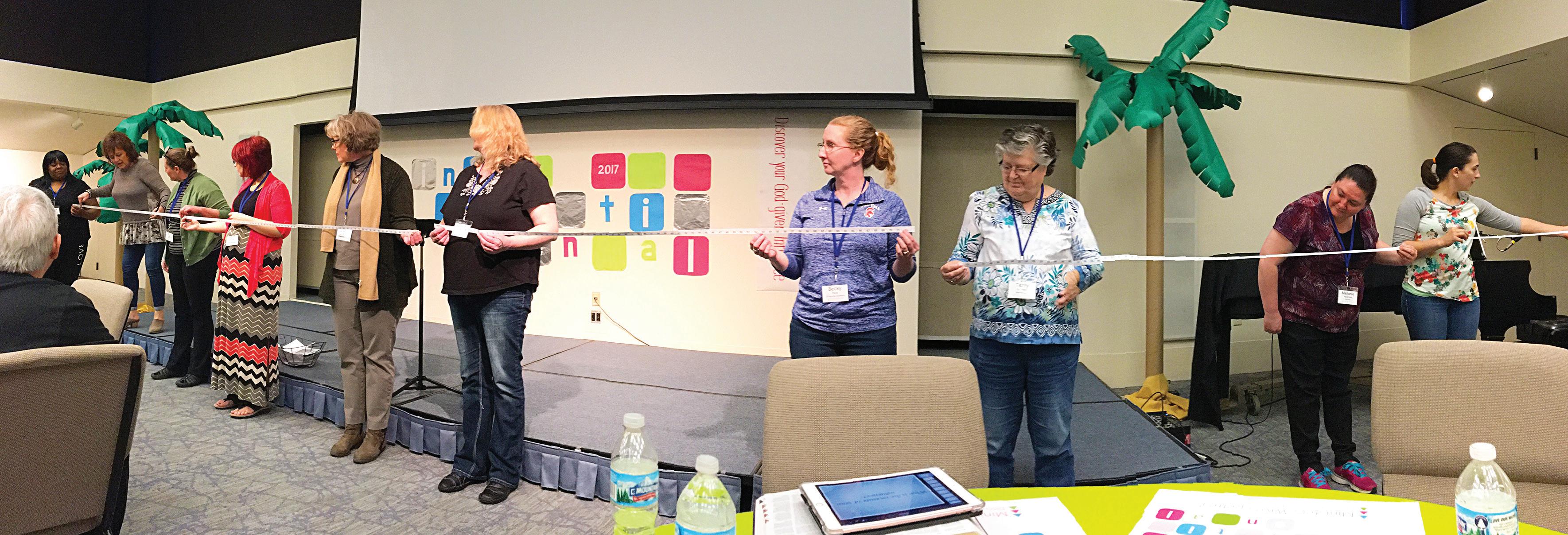
try wives, and even a painting class. Artist Libby Morecraft, the wife of Saline Association Director of Missions Rusty Morecraft, led the women to create their own version of a sun-drenched ocean landscape.
“I always hear groans during the painting,” said Morecraft, who has led the painting parties in Illinois churches for outreach, fellowship, and to raise money for missions. “But then everyone turns out their own masterpiece.” Morecraft said she was encouraged to see so many young, new ministry wives at the retreat. “I really connected with a precious young minister’s wife and we are already e-mailing.” During the retreat’s opening session, women rotated between tables, answering rapidfire icebreaker questions and getting to know each other.
“It’s always encouraging to reconnect with fellow ministers’ wives that I only get to see once a year,” Morecraft said. “I love these ladies!”
LENGTHEN YOUR LEGACY – At an annual retreat for IBSA ministers’ wives, speaker Diane Nix asked women to find their age on a measuring tape, consider their current influence, and think about what they want to do with the rest of their lives.
FRIENDS – Mattie Randle (below, right) of Resurrection House Baptist Church in Chicago gets to know other ministry wives during the retreat’s opening session. Photos by Lindsay McDonald and Meredith Flynn
Carmen Halsey, IBSA’s director of women’s ministry and missions, said she heard similar feedback from retreat attenders. One particularly appreciated the time to laugh and talk transparently about their shared experiences. And many wives are following up on upcoming events, Halsey said, including an online study of the book “StrengthsBased Marriage” and a ministers’ wives mission trip to New York City. For more information about these opportunities and others for women, go to IBSA.org/women.

6 IBSA. org Illinois Baptist
NIX
Ministers’ wives have greater impact than they may think
IN FOCUS
Surrendered life
special section
Like Moses at the burning bush, you can persist in your excuses, or surrender to the call of God on your life

Martyn Lloyd-Jones was one of the greatest preachers of the twentieth century. He pastored the Westminster Chapel in the heart of London for nearly three decades, and by the end of his ministry he was one of the most influential ministers on earth. But before LloydJones was a great preacher, he was an accomplished physician. After earning his medical degree, he came under the tutelage of Lord Horder, caregiver to His Majesty, King George V, and enjoyed one of the most promising medical careers in all of England.
In considering God’s call to ministry, Lloyd-Jones wrestled with his “physician’s dilemma”—giving up medicine to pursue preaching. Ultimately, it was a war of desire, and his desire for ministry won out:
“We spend most of our time rendering people fit to go back to their sin! I want to heal souls. If a man
has a diseased body and his soul is all right, he is all right to the end; but a man with a healthy body and distressed soul is all right for sixty years or so and then he has to face eternity in Hell.”
From his book, “Discerning Your Call to Ministry,” Midwestern Baptist Theological Seminary President Jason K. Allen offers insight on ministry, calling, and Christian education.
Are you willing to surrender?
A generation ago, “surrendering to ministry” was a common phrase in evangelical churches. It was certainly common in my childhood church. Most every sermon ended with an invitation to surrender to ministry. This immediately followed our pastor’s appeal to follow Christ, be baptized, or join the church.
Plus articles on vocation and calling
“Thank you to my Christian college” by Meredith Flynn
Helping young people prepare for a life of service
IBSA. org 7 April 10, 2017
8
P.
Continued from page 7
As a boy, the phrase “surrender to ministry” both mystified and unnerved me. It sounded as though one was embracing an unwanted life, a call to a distant land for an undesired work. It seemed like a call one intuitively resisted—as long as possible—until finally buckling under the Spirit’s pressure and embarking on a life of ministry that, albeit noble, would be marked by sacrifice and hardship.
In hindsight, I do not think that is what my pastor meant, nor do I think that is what the New Testament implies. As I found in my own life, surrendering to ministry is not caving to an unwanted vocation; it is embracing what becomes increasingly irresistible: gospel ministry.
In other words, if by surrendering to ministry we mean engaging in an undesirable work, then jettison that phrase now. But if we mean surrendering to minister as unto the Lord and self-consciously choosing to forgo other life opportunities, conveniences, and ambitions, then surrendering to ministry is a good, healthy phrase. In fact, I am convinced “surrendering to ministry” is a phrase the church needs to recover and ministry-posture the church needs to cultivate. Every faithful ministry begins with a surrendered life, and that submissiveness shapes every aspect of one’s ministry, including why, where, and what one preaches.
What surrender entails
Surrendering to ministry rightly establishes the pastor’s motivation. After all, the pastor’s incentive should not be material gain, the applause of men, or any other earthly enticement. Rather, the preacher should, like the apostle Paul, know in his heart, “If I preach the gospel, I have nothing to boast of, for I am under compulsion; for woe is me if I do not preach the gospel” (1 Cor. 9:16).
Jason Allen’s 10 questions for discerning your call to ministry
1. Do you desire the ministry?
2. Does your character meet God’s expectations?
3. Is your household in order?
4. Has God gifted you to preach and teach his Word?
5. Does your church affirm your calling?
6. Do you love the people of God?
7. Are you passionate about the gospel and the Great Commission?
8. Are you engaged in fruitful ministry?
9. Are you ready to defend the faith?
10. Are you willing to surrender?
To surrender to preach the ministry is to be so gripped by God’s call, and so moved for His glory, that one shares Jeremiah’s burden: “If I say, ‘I will not remember Him or speak anymore in His name,’ then in my heart it becomes like a burning fire shut up in my bones; and I am weary of holding it in, and I cannot endure it” (Jer. 20:9).
The urgency with which one preaches may ebb and flow based on a multitude of factors, including the receptivity of the congregation, the preacher’s spirituality vitality, and the tenor of the text itself. But, for the man rightly surrendered to ministry, the “why” of the ministry is settled—it is for Christ and His glory.
Additionally, surrendering to ministry includes a determination to follow God’s call wherever it may lead. This may include a willingness to leave family and friends, go to a distant place, and undertake a new work. After all, Jesus reflected, “Foxes have holes, and the birds of the air have nests, but the Son of Man has nowhere to lay his head” (Matt. 8:20).
Two stories of surrender
The Bible offers no better case study of surrendering to ministry than the Old Testament prophet Jonah. God called Jonah to go to Nineveh, and preach repentance so the people there might be saved. It’s crystal clear that God was concerned about the why, where, and what of Jonah’s message.
Tragically, Jonah resisted God’s call in spectacular fashion. When God called Jonah, he was in Israel. God instructed him to go to Nineveh, which was about 550 miles east of Jerusalem in what is now modernday Iraq, but Jonah did the exact opposite. He struck out for Tarshish, located in modern-day Spain, some 2,000 miles in the opposite direction!
Too many ministers are perfectly willing to follow God’s call as long as it does not lead out of their hometown. Such kingdom restrictiveness is alien to the New Testament and stymies one’s availability to be used by God. Practically speaking, you can know if you are limiting God’s call if you’ve already placed— perhaps even unconsciously—limits on where you are willing to serve Christ.
A willingness to go wherever includes a willingness to minister to whomever. There are churches across the land poised for anything but numerical success. Challenging demographics, an unreceptive audience, or a dilapidated neighborhood might make God’s call unattractive, but if it is God’s call, it is a glorious one—regardless of the zip code. After all, struggling churches and dying communities need ministers, too. God typically calls more to a people than a place. If God calls you to minister to a church in a challenging area, are you willing to go?
Surrendering to ministry also means operating under the authority of God’s Word. Most especially, this relates to the act of preaching itself. The role of the preacher is not to cobble together anecdotes with human insights and then sprinkle in a couple of Bible verses to produce a “homily.” The faithful preacher tunes his ear to the Spirit of God, not the critic’s grumble. His finger is on the text, not in the air, gauging the wind. His voice is given to preaching the Word, not peddling shallow sermons for shallow people.
Too many pastors are textual acrobats, contorting their preaching to avoid Scripture’s sharper edges. Such preachers have become adept at explaining away difficult texts and dodging confrontational verses. From the earliest days of ministry you’ll have to guard your heart from pleasing anyone other than the Lord. Fearing combative personalities, overreacting to legitimate criticism, or stubbornly desiring man’s approval can all compromise your message and disorient you from paramount loyalty: loyalty to the One who called you—God Himself.
Why did Jonah resist God’s call to preach repentance to the Ninevites? The Ninevites were the sworn enemies of the Israelites. The last thing Jonah wanted was to see the Ninevites repent and escape God’s impending judgement. In fact, Jonah actually confessed that he fled to Tarshish because he knew God was “gracious and compassionate, slow to anger and abundant in loving kindness, and one who relents concerning calamity” (Jonah 4:2). God’s ministers are not spiritual free agents. We are not ecclesiastical entrepreneurs who strike out on our own and minister in accordance with our own desires. As Jonah’s sin was running from God’s appointed place of ministry, a more common twenty-first-century sin might be running to a preferred place of ministry.
On the contrary, aspire to be like John Piper, who went to Bethlehem Baptist Church in 1980 despite a small, aging congregation in dilapidated facilities located in a transitional neighborhood. He sensed God’s call, followed it, and has been used by God like few others in our generation.
A number of years ago I faced a similarly challenging decision. A church reached out to me about helping them through a season of challenge and transition. I felt God’s leading to serve the church, but several friends sought to dissuade me. I vividly recall one friend telling me, “Stay away. That church will ruin your resume. It’s a troubled congregation in a troubled part of town. Billy Graham couldn’t grow that church. You’ll have plenty of great opportunities in the years ahead. Don’t settle for anything less than God’s best for you.”
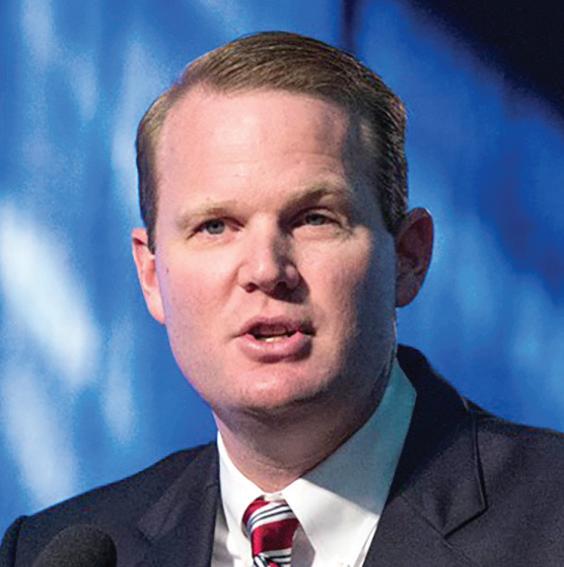
Though well intended, that counsel was altogether unhelpful and disorienting. For a while it confused me, until I remembered that God’s will for my life is God’s best for my life. By enlarging my circle of wise counselors, reflecting on the church’s needs, and my wife and I seeking the Lord and gaining His peace, it became clear that God was indeed calling us to that church.
The bottom line is, if you had a million lives to live you could not improve upon the life God has called you to live and the ministry to which He has called you. Don’t settle for second best by choosing the path of least resistance or the ministry that promises the best payout. Seek God’s will and surrender to it.
These days the phrase “surrendering to ministry” seems a vestige of the previous generation of church life. This is more than unfortunate; it is unhealthy, and the church is the big loser.
Surrendering to ministry means you’re willing to go to anyone, anywhere, anytime. But don’t be confused; as you surrender you will enter more fully into God’s joy and blessing. A surrendered life is integral to a healthy ministry.
– Reprinted by permission
8 IBSA. org Illinois Baptist
SPECIAL SECTION
ALLEN
Don’t settle for the path of least resistance or the best payout. Seek God’s will and surrender to it.
Master of Arts in Leadership


Wise counsel for major decisions
How
Jeff Reep works to help students make the right decisions for their futures, even if the process takes a while.
“It’s always better to get it right than to get it fast,” the director of career services tells students at Cedarville University, a Christian school in Ohio. Indeed, many collegians report not getting it right on their first attempt. Reep points to a statistic from leadership expert Tim Elmore that found 40% of college graduates wish they had chosen a different major.
It’s easy to see how it happens to so many people, Reep said. Well-meaning people at church or in the community start asking a student in high school where they’re planning to go to college and what they’ve chosen as a major. The response—business, education, etc.—often isn’t based on how God is leading, or how the student is wired. Instead, it becomes something that’s easy to repeat. All of a sudden, Reep said, the student is a junior in college who’s never really struggled with what they’ll do with their degree once they’ve earned it.
That trajectory puts students on the fast track to joining the majority of Americans who aren’t happy in their work, Reep said. The number of satisfied workers inproved slightly over the last decade, according to the Conference Board’s annual job satisfaction survey. Still, just over half of the population say they don’t like their job.
“So many times, people look at a lifestyle and don’t consider a life work,” Reep said. A young person might aspire to live in a certain neighborhood or achieve a certain level of prestige, for example, but
they don’t consider what kind of work is actually required of a particular vocation.
At Cedarville, Reep’s team helps students in three basic areas: exploration, which includes counseling about careers, internships, and majors; navigational skills, or developing resumés, cover letters, and other tools needed in a job search; and networking opportunities with faculty and employers who can help them as they investigate their options. Everything Reep’s team does is designed to help students answer big questions: Who am I? And where does God want me to be?

can help you as you’re thinking through these things, or who can refer you to someone else who can help?
2. Ask for advice. Proverbs 11:14 says there is safety in a multitude of counselors. Reep urges students to heed Scripture’s encouragement to seek out wise advisors. And not just for job or internship opportunities. People are honored when you ask for career advice based on their experience, he said. And they may be able to point students to opportunities they haven’t yet considered.
3. Delight yourself in the Lord. The counsel of Psalm 37:4 is especially comforting for students seeking God’s will for their future. If a student can say they’re delighting in the Lord, that he’s their treasure, their satisfaction, and their identity, Reep said, then the next question is: What do you desire to do?
“If there is something that you desire to do, put it out there,” he advises. “And then start moving toward it.” And stay open to how God might continue to shape that desire.
When he talks with students, Reep tells them he knows what God wants them to do, which is a pretty major assertion that he doesn’t take lightly. But there are three things he says he feels sure the Lord is calling them to do as they think about the future. The three steps can be helpful to pastors and church leaders as they help students in their congregations navigate the same issues:
1. Pray about it. And pray specifically, Reep advises. Ask God to put people on your mind who you should talk to about a potential career direction. Who
The differences between “vocation” and “career” and “calling” can be confusing for students trying to make sense of their options. But Reep says every Christian is in full-time ministry. “Whether it is [as] a pharmacist or at a state university or on the mission field. And God is the one that provides for each of those people.” Calling goes back to “am I really, totally surrendered to him, am I a living sacrifice for him, is my treasure, satisfaction, and identity in him,” Reep said. “Then, out of that, what I do is my service, my calling.”
to help students ask—and answer—big questions about the future
I really surrendered to God? Is my treasure, satisfaction, and identity in him?”
“Am
10 IBSA. org Illinois Baptist SPECIAL SECTION TRANSFORMING LIVES Learn more: cedarville.edu Also offering online GRADUATE PROGRAMS in Business (M.B.A.) Ministry (M.Min. and residential M.Div.) Nursing (M.S.N.) Pharmacy (residential Pharm.D.) online.cedarville.edu 130 professional and liberal arts programs Literal six-day creation taught in all programs Required Bible minor Study abroad opportunities reaching nearly every corner of the world Daily chapel with Christ-honoring worship and top speakers 97% placement rate at organizations like Answers in Genesis, Boeing, Microsoft, and NASA
– Meredith Flynn
– Jeff Reep
To my Christian college: A thank-you
Ihadn’t intended college to be a particularly eyeopening experience. I was excited about my newfound freedom and interesting classes and those deep friendships everyone always talked about, but I was going someplace where I thought all those things would happen in the context of familiarity. My Southern Baptist college had felt like home during my first on-campus visit—that was what drew me there in the first place.
But at the start of my second semester, I sat with my Bible on the roof of the gymnasium (where the serious scholars went to study all night), wondering whether the loneliness and uncertainty I felt meant I had made the wrong decision in coming to a place six hours from home. Those good college things—the classes and the friends and the football games and the freedom—had all happened. But instead of feeling fulfilled, I was left with a bigger question, one that I now know most people that age, particularly younger Christians, probably face at one time or another: Who am I going to be?
A few years later when I graduated, I was glad I had been at that small college six hours from home as I tried to answer that big question. Because it was there that I found people with the knowledge, experience, and empathy to help young people navigate that tricky territory between the familiar and the future. Here are three things I still value about my Christian college experience:
1. A deeper faith identity. Raised in a minister’s home, I thought I had Christianity figured out (and, at 18, probably most everything else too). That’s why it was surprising, then convicting, to find other people
my age who knew much more and felt much more about the call of Jesus on their lives than I did. And these weren’t just the kids that had committed to career ministry or missions—these were everyday students studying to be dentists, attorneys, and counselors. But they seemed to understand that the responsibility of a Christian to be, well, a Christian, extended far beyond one’s future vocation. They lived their faith in a way I wanted to, and their example pushed me to a deeper investigation of what it meant to be actually be a believer in Christ, no matter what job I would eventually choose.
2. Challenging, trustworthy professors. My first class on my first day of college was Old Testament Survey, taught by a young professor who would present four or five different theories about a difficult text and then say something like: “That’s what some people think. Here’s what I think.” Usually, his opinion was similar to one that he had presented. But by giving us the breadth of knowledge on a particular topic, he showed us young Bible scholars that it’s OK to wrestle with Scripture. At the same time, his daily, trustworthy counsel through the Bible gave us an anchor to come back to amid the multiple interpretations offered by the outside world.
3. Unrequired opportunities. Like many high school youth group kids, I started going to church because my parents drove me there, and I kept going because I had always gone. But in college, I didn’t


have to be anywhere. Tuesday night Bible study wasn’t a necessity; neither was a Saturday mission project in our neighboring city. Learning to commit to things that weren’t required drove me to deeper discipline about how I spent my energy and time. The ministry activities that are most valuable, I learned in college, are the ones that root themselves in your mind and heart so that you are compelled to take part, even if no one would miss you if you weren’t there. After I graduated, I moved to the Midwest to attend graduate school at a large state university. It was certainly different than where I had been. And that’s one more reason I’m grateful for my college experience: The foundation that God, through wise professors and leaders, had begun to lay for me carried me through the challenges of a truly unfamiliar place. And has continued to do so, all these years later.
– Meredith Flynn
ONLINE DUAL CREDIT COURSES AVAILABLE for high school juniors and seniors! 1600 University Avenue, Bolivar, MO 65613 | (800) 526-5859 | www.SBUniv.edu
FLYNN
I met people my own age who pushed me to a deeper investigation of what it means to be a Christian, no matter what job I would eventually choose.
reporter’s notebook sound off
Letter to the Editor
I read your article entitled “What is Steve Gaines doing?” (Reporter’s Notebook, March 20). I was a little “taken back” at first, mainly by the title and opening comparison to Ronnie Floyd. Overall, it’s a fair question.
Let me give you a couple of things that he has done.
First, the latest edition of the Tennessee Baptist and Reflector is running a story on how Steve has led Bellevue Baptist (the church he pastors) to become the first church in the history of Tennessee Baptists to give $1 million to the Cooperative Program through the Tennessee Baptist Convention in the span of one year.

Second, he was the featured speaker at the recent Evangelism Celebration at Union University where he greatly challenged 800 Baptists to serious prayer for the lost and personal involvement in evangelism. It was an amazing night!
Third, Pastor Steve recently challenged the Executive Committee at our meeting in Nashville by pointing us to the Great Commission, prayer, and unity, and away from recent squabbles. Again, it was a spiritually moving evening.
I’m sure there is much more.
Why pastors need a code of ethics
A bill in the Illinois Senate that would have required pastors to take state-regulated classes in child protection raises important questions: Shouldn’t pastors do all they can to protect children, one colleague asked. Yes, obviously, but at what risk to religious communities’ First Amendment rights?
And, as important is this question: Why aren’t clergy engaging in stronger self-policing using a mechanism most already have in place, the ministerial code of ethics?
Sen. Melinda Bush of Lake County withdrew the bill last week, after objections from pastors on First Amendment grounds: If the state requires pastors to receive certification in this well-intended and altruistic concern, then what’s next? There aren’t many steps from this bill to government licensure of clergy and churches. “Won’t somebody please think of the children!” isn’t a sufficient argument to allow government regulation of pastoral work.
And, there’s a better way.
Ron Hale
(Editor’s note: Ron Hale is a former IBSA staff member. Now retired, he lives in Tennessee. In addition to Ron’s report here, we have learned about a statement on unity involving the SBC, ERLC, and several leaders. See page 1.)
As a seminary student, I was required to write for myself a ministerial code of ethics. I studied a dozen examples and came up with a list of biblical and ethical ways for dealing with people, issues, and sticky situations.
A year or two later, I was the grader for
that class, and I read scores of codes of ethics submitted by students. Most of these aspiring pastors took the assignment seriously, considering how they should handle counseling and confidentiality, reporting of abuse or neglect, the pastor’s relationship to the law and enforcement agencies. Some addressed euthanasia, and a few spoke to sexual identity and relationship issues just entering public discourse at the time.
Some of these students laid a good foundation for engaging and regulating their future work, so when hard questions arose, they already had biblical ways of processing the issues not based on emotion and reaction.
A good ministerial code of ethics guides pastors in their ministry to children and families in jeopardy. It requires that pastors stay up-to-date on the issues and the law. Through such personally adopted codes, pastors police themselves. They may join in voluntary association with other clergy in their enforcement.

Our Baptist polity—respecting the autonomy of the local church—doesn’t allow the denomination to enforce rules on pastors. Neither does the U. S. Constitution. That’s why we must take responsibility to govern ourselves.
For the sake of the children.
– Eric Reed
12 IBSA. org Illinois Baptist
The crowd is often wrong. Popular opinion frequently misses the truth. And unfortunately, it seems that unrighteousness is usually trending.
From the earliest days of human history that has been so. The crowd was wrong in the days of Noah, as it was in the gathering at Babel. Godliness was often forsaken in the days of the prophets, and the dominant culture was usually wrong in the days of the early church.
But the crowds gathered for Jesus’ triumphal entry into Jerusalem got it gloriously right.
The crowds that gathered in the city just days later would call for the murder of Jesus. Many political and religious leaders would exult in his crucifixion. But first, the gathered people welcomed the Messiah and Savior of the world.
Let’s note three ways the crowd got it right as we consider our response to Jesus this Easter season:
1. The crowd was right to give honor. The people got word that Jesus was entering the city and they immediately stepped forward to honor him. He entered on a borrowed donkey, which both fulfilled Old Testament prophecy and spoke to his humility. People rushed to cushion each step by placing palm branches and even their own cloaks on the ground before him.
We rightly honor Jesus by our care for the things of God. When we care more about the glory of the Lord than our own comfort, we honor him. When we sacrifice our time and energy and possessions, we honor him. When we look for ways to bless his work, we honor him.
I pray you will honor the Lord with your life this Easter season. Honor him by loving the things that matter. Honor him with your sacrifice for the things that count. Honor him with a bent knee and a giving heart. May we remember all that Jesus is and all that he has done. And we honor that memory and that mission as we gather with the crowd.
2. The crowd was right to worship. The people began a spontaneous worship service as Jesus passed by just a few days before his crucifixion. They sang out snatches of the Psalms. Their cries of “Hosanna”—a word of praise from the Hebrew word for “salvation”—rang out above the noise. They sensed the working of God to save mankind from sin and could not contain songs of loudest praise.
I hope you will worship the Lord joyfully this Easter season. He is worthy of all your praise. By his death, we can find life. By his work, we can find meaning and purpose in the work of our lives. By his resurrection, we have power over death and the grave. We have ample reason to praise our Messiah, Savior, and Lord.
When you gather for worship on Sunday, remember who Jesus is and what he has done. And praise
him from the depth of your heart. Jesus told the skeptical Pharisees who hated this praise that the rocks would cry out if the people didn’t. We have a reason to sing and a reason to shout, and the gathered crowd reminds us of this privilege. Let no stone be needed to take your place in worship. Praise his name fully and powerfully.
3. The crowd was right to proclaim. Matthew’s Gospel tells us the city was shaken by the crowd’s praise. People asked who it was that passed by. The crowd proclaimed, “This is the prophet Jesus from Nazareth in Galilee” (Matthew 21:11)!
We gather in worship during the Easter season to proclaim the message of Jesus. We proclaim the gospel message that Jesus is God’s only begotten Son, that he died to pay the penalty for our sins, that he was buried but that he rose from the dead on the third day. We proclaim Christ as our Savior and as our King. We proclaim that he is the only hope for the world. We proclaim that he will return one day to claim his own and that those who repent of their sins and place their faith in him will live for eternity with him in heaven. This is our proclamation in song and sermon and life.
The crowd got it right that day. Let’s gather this season with other believers and all those who will hear and, together, honor and worship and proclaim the name of Jesus. There will be no need for stones to take our place.
Doug Munton pastors First Baptist Church, O’Fallon, and also serves as first vice president of the Southern Baptist Convention.

Let them eat meat
The Protestant Reformation in Europe shed new, revolutionary light on many religious traditions of the day, including how people observed the Easter season. In the spring of 1522, a Swiss reformer named Ulrich Zwingli took a stand at a dinner party that sent shockwaves through Zurich and cemented the changes that were sweeping across the continent.
Before Easter that year, Zwingli, a priest, attended a feast held by a local printer. The meal was on a Friday during Lent, recounted Reformation scholar Stephen Nichols in his “5 Minutes in Church History” podcast, but some of the guests ate sausages—a strictly forbidden practice during the season traditionally dedicated to fasting from meat.

While Zwingli himself didn’t eat the sausages, Nichols said, he did lend the group his support in a subsequent sermon titled “On the Choice and Freedom of Foods.”
“In this sermon, Zwingli makes a very simple argument,” Nichols said. “He can’t find Lent in Scripture. He’s looked far and wide and he can’t find these restrictions that the church has imposed upon people.
“And not only is it about Lent, but Zwingli’s beginning to see that there’s this almost like a scaffolding that is being built around the gospel of all these regulations, all of these things that we are to be doing to somehow earn God’s favor, or earn God’s merit, or somehow achieve some level of righteousness.”
Zwingli’s involvement in the Reformation continued the next year, when he published 67 theses which Christianity Today called “more persuasive” than Martin Luther’s earlier complaints against the Catholic establishment. At the very least, Zwingli’s country was more responsive—he was allowed to continue preaching, and within two years, the traditional Mass was abolished in Zurich in favor of a simpler service, and images of Jesus, Mary, and the saints were removed from churches.

The lasting mark of Zwingli’s ministry was his devotion to the Bible. “For God’s sake, do not put yourself at odds with the Word of God,” he wrote. “For truly it will persist as surely as the Rhine follows its course. One can perhaps dam it up for a while, but it is impossible to stop it.”
– Meredith Flynn, with information from Christianity Today and “5 Minutes in Church History”
IBSA. org 13 April 10, 2017
Reformer (and sausage proponent) Ulrich Zwingli
Once in a while, the crowd gets it right
table talk
Just days later, the people would call for Jesus’ murder. But on that Sunday, they welcomed him as Messiah.
I’ve titled my Easter sermon, “Ten Subtle Signs of Compromise in the Church.”
Let your light ‘so shine’
Summer camps kick off with more weeks for kids, teens
IBSA’s summer camps kick off June 9, with more weeks for children and students to experience camp in northern and southern Illinois, plus a totally new camp for teens. With words like “shine” and “illuminate” in their themes, the 2017 summer camps are designed to compel campers to let the light of Christ shine in their lives.
The summer camps saw an increase of 100 campers last summer, said IBSA’s Mark Emerson, and this year’s slate includes new associational and church partners. In conjunction with IBSA, Heartland Baptist Network (formerly Cap City Baptist Association) will hold their first children’s camp in more than 25 years. Additionally, IBSA will partner with Cross Church to host Fused, a new camp for students.
2017 camps include:
Father/Son Camps at Streator Baptist Camp (June 9-10) and Lake Sallateeska (June 16-17) are for dads and sons, grandfathers and grandsons, and adult mentors and young men of all ages. Cost is $40; register at IBSA.org/kids.
So Shine Camps for kids and teens will run for five weeks at Lake Sallateeska and Streator:

Week 1: June 12-16 (Streator, grades 3-6)
Week 2: June 18-22 (Lake Sallateeska, grades 3-6)
Week 3: June 26-30 (Lake Sallateeska, grades 3-6)
Week 4: July 10-14 (Streator, grades 3-12)

Week 5: July 17-21 (Streator, grades 3-12)
Cost is $160 per person, which includes meals, lodging, and a camp T-shirt. Register at IBSA.org/kids.
Illuminate Student Camp for teens in grades 7-12 will coincide with week 3 of summer camp (June 26-30) at Lake Sallateeska, but it is a completely unique experi-
Something to crow about
Church planter Dave Andreson and his family got a new, noisy neighbor last month when a rooster wandered into their Avondale garage. Andreson, who pastors Resurrection City Church in the neighborhood on Chicago’s north side, posted about the guest on Facebook until a local farm-dweller came to take the feathered friend to greener pastures. In the meantime, the Andresons named the rooster Pete (and later, the Dark Knight).
In return, he alerted the neighborhood that it was Sunday morning. “The rooster has been crowing for an hour,” Andreson posted.

“I guess he’s trying to wake folks up for church.”
Pastors’ Conference scholarships
The Southern Baptist Convention Pastors’ Conference will provide $1,000 travel scholarships to pastors of “average-sized churches” who cannot otherwise afford to attend the Pastors’ Conference and SBC annual meeting this summer in Phoenix, the event’s leadership team announced on the SBC Voices blog.


The June 11-12 conference will feature pastors of churches ranging in size from 60 to 500, including David Choi of Church of the Beloved and Michael Allen of Uptown Baptist Church, both in Chicago.
Pastors’ Conference President
Dave Miller told Baptist Press larger churches traditionally have helped fund the event. This year, conference costs have been covered by other sponsors, freeing the conference’s traditional sponsors to help in a new way.
“God has provided for the Pastors’ Conference, so we are asking people to help by sending smaller and average church pastors who couldn’t afford to come.”
Pastors can apply for the scholarships at SBCVoices.com beginning April 10 at 11 a.m. Eastern Time.
– From Baptist Press
ence, Emerson said. Cost is $160 per camper; register at IBSA.org/ students.
Fused Teen Camp (July 16-21) is for students in grades 6-12 at every stage of a relationship with Christ, from those who don’t know him yet to teens who are committed believers. Cost is $265 per person; register at IBSA.org/students.
IBSA also will host three more weeks for students:
Super Summer at Greenville College (June 27-July 1), a discipleship-focused week for students entering 7th grade and above; IBSA. org/students.
Summer Worship University at Hannibal-LaGrange University (July 10-14), offering training in worship and arts for students in grades 6-12; IBSA.org/students.
ChicaGO Week at Judson University (July 23-28), a church planting-focused experience for students in junior high through college; IBSA.org/churchplanting.
people
New call
Justin Reynolds is the new pastor of Charity Baptist Church in Carlinville. Since 1994, he has served churches in western Kentucky and Illinois, including his most recent pastorate, First Baptist Church in Odin. Reynolds is a graduate of Mid-Continent Baptist Bible College in Mayfield, Ky., and currently is working toward a Master of Divinity degree from Slidell Baptist Seminary.
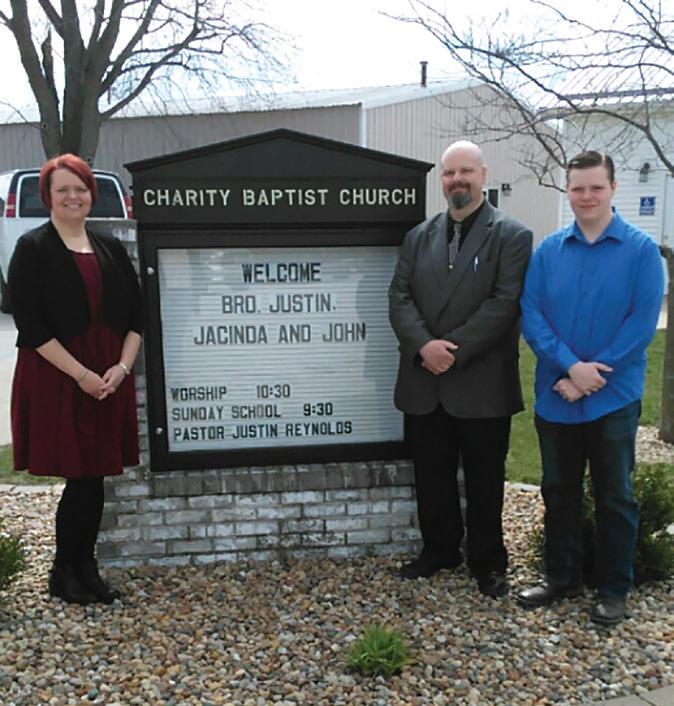
He and his wife, Jacinda, have three children, Justin, Jacqueline, and Jonathan (pictured with his parents below), and a son-in-law, David.
Climate Change & the Christian
E. Calvin Beisner, Ph.D.
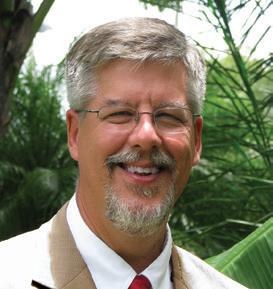
Founder & National Spokesman, The Cornwall Alliance for the Stewardship of Creation www.cornwallalliance.org
April
What others say about Dr. Beisner “…
would describe as encyclopedic. You’re one of them!”
— Dr. R. Fowler White, Dean of Faculty, Knox Theological Seminary
“The people loved his lectures, with many … wishing that he could have spoken more.”
— Rev. Phil Kayser, Providential History Festival, Omaha, NE
14 IBSA. org Illinois Baptist
What’s True, What’s False, What’s Our Responsibility? Contact Us: 708-781-9328 | www.illinoisfamily.org Forum
25th Rockford
26th Arlington Heights
27th Orland Park
April
April
April
28th Peoria
an excellent speaker who … held my 200-person Bible class spellbound for an hour!” — Dr. Wayne Grudem, Scottsdale Bible Church “I’ve known two people in my life whose knowledge I
Super Summer 2016
KNIGHT TIME – Avondale’s new alarm clock (and church planting tool)
EVENTS dave says
Lunch and Learn Webinars
What: A half-hour of leadership training, every third Wednesday, 11:30 a.m.-Noon
Info: IBSA.org/women (click on “Trainings”)
April 21-22
Disaster Relief Training
What: Classes in food prep, mudout, childcare, chaplaincy, and more
Where: Streator Baptist Camp
Cost: $40 new volunteers, $10 badge renewals, $10 yearly training, $10 overnight stay
Info: IBSA.org/dr
April 28-29
Priority Women’s Conference
What: The women’s event of the year! Come experience a fresh challenge to serve where God leads you, teaching from top ministry leaders and missionaries, and spiritual renewal and worship among friends.
Where: Tabernacle, Decatur
Cost: $25
Register: IBSA.org/women (click on “Event Details”)
April 29

All for Him 5K Walk/Run
What: Co-ed event coinciding with IBSA’s Priority Women’s Conference

Where: Fairview Park, Decatur
Cost: $25 per person
Register: IBSA.org/women (click on “Event
Details”)
June 3
Missions Spectacular
What: IBSA’s largest annual one-day mission project, with multiple sites around the state Info: IBSA.org/missions
June 3
BCHFS Central Illinois Golf Tournament
What: Annual fundraiser for Baptist Children’s Home and Family Services
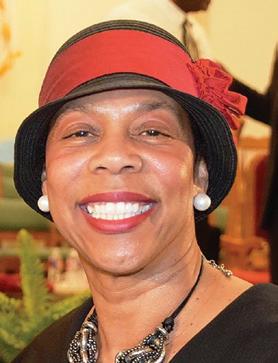

Where: Edgewood Country Club, Auburn Info: BCHFS.com
June 12-14
SBC Pastors’ Conference & Southern Baptist Convention
Where: Phoenix Convention Center Info: SBC.net
Where’s the reward?
QWe’re trying to get control of our finances, and my husband wants to close all our credit cards. I want to keep one and use the bill-pay option for monthly stuff like utilities, so we can keep earning rewards points. I look at my way as a method of just re-routing the money and paying it off each month. Am I wrong in looking at it like this?
AYes, you are. Life never goes as planned. You can have all the well-reasoned and best-intentioned ideas you want, but sooner or later something will go wrong.
Why not use a debit card that has a rewards system attached?
Lots of debit card programs offer the same kinds of rewards programs that credit card companies do, with one big exception—you don’t have to go into debt!
Studies have shown that the vast majority of people never redeem their credit card airline miles. Other studies show that people spend more when using credit cards as opposed to cash. That extra money you spend on things you don’t need is money you could have been saving and investing.
So, where’s the reward?
Call your State Representative to OPPOSE HB 40


HB 40 removes all prohibitions on taxpayer-funded abortion throughout all nine months of pregnancy under Medicaid and removes the ban from state employees’ insurance policies paying for abortions. Because a half million have been added to the Medicaid roll in the last 5 years, we could see 15,000 or more babies slaughtered with our tax dollars each year!
Please call your state representative and urge him/her to oppose HB 40. If you don’t know who your state representative is, please call us at 708-781-9328.
Rescue those who are unjustly sentenced to death; don’t stand back and let them die. Don’t try to disclaim responsibility by saying you didn’t know about it. For God, who knows all hearts, knows yours, and he knows you knew! And he will reward everyone according to his deeds.
—Proverbs 24:11-12 (Living Bible)
708-781-9328
For more information and updates, please visit illinoisfamily.org.
 DAVE RAMSEY
DAVE RAMSEY

Collections and creditors
QWe were very late on one of our credit card bills, and now it has been turned over to a collection agency. The collection company has offered us three or four different payment options. Does the original creditor accept the agreement, too, if we accept one of the collection agency’s options?
AIn most situations of this type, the collection agency owns the debt outright or they’re directly representing the original creditor. It’s pretty much standard operating procedure when someone has defaulted on a loan. My advice would be to accept the deal they’ve offered that makes the most sense for you and your current financial situation. It’ll ding your credit report, and show a settlement on the defaulted credit card, but that’s not the end of the world. There’s already a mark against you for it being turned over to collections. If you want to keep things like this from happening in the future, you need to get control of your finances. Stop playing with credit cards!
IBSA. org 15 April 10, 2017
Financial advisor Dave Ramsey is a prolific author and radio host.
IBSA Annual Women’s Conference Tabernacle Baptist Church, Decatur April 28-29, 2017 Cost is $25 per person (IBSA-affiliated churches) IBSA.org/Women
Chris Adams Lifeway
Sandy Wisdom-Martin National WMU Executive Director
Elizabeth Luter Franklin Avenue Baptist Church, New Orleans
Hosanna Poetry Dramatic Arts
Church needed here...
Location: Chicago Heights and South Chicago Heights
Focus: First- and second-generation Latinos
Characteristics: These communities have a Latino population of more than 11,000 people. They are a blend of first-generation residents who work as landscapers, remodelers, mechanics, and manufacturers, and second-gen Latinos with jobs in fields like education and health care. There currently is no Latino Southern Baptist church in these two cities that can reach out to the two segments of the population.
Prayer needs: Pray for a church planter to start a Bible study, for a partnering church, for safety in these communities, and for gospel sensitivity.
The old battle
Read: Exodus 2:11-12; 32:15-16, 19; Numbers 20:1-13
The old sinful nature wages war against the new life from God. The enemy tempts us to stray from righteousness. The Lord tests us throughout our lives to crucify the flesh and follow Christ.
Moses suffered from an uncontrolled temper and at times it manifested itself in explosive fashion. In a murderous, vindictive rage he killed an Egyptian.
When Israel worshiped the golden calf, Moses gave way to a destructive anger as he hurled the written Word of God to the ground and destroyed the stone tablets.
KEVIN CARROTHERS
As the forty-year wilderness wanderings came to a close, God tested Israel. Once again Israel had no water and quarreled against Moses. God gave Moses very specific instructions to meet the need, but Moses filled with fiery hostility against the people that he willfully deviated from God’s plan. This act of unbelief and disobedience cost Moses entrance into the Promised Land.
When we choose our own path, like Moses, instead of God’s direction, we demonstrate our unbelief. When we defiantly act out in public, it detracts from God’s glory. When we sin, there are always consequences to it. Regardless of how close we are to the Lord or how long we have walked with God, the battle of the flesh exists.
PRAYER PROMPT: Lord, may we be quick to hear, slow to speak, and slow to anger, for our anger does not accomplish your righteousness. Help us defeat sin in our lives.
Kevin Carrothers serves as director of missions for Salem South Baptist Association and is concluding his second one-year term as IBSA President.


inspirations
pinterest.com/illinoisBaptist





Mom’s day, busy day

Believe it or not, next to the Sunday before Christmas and Easter Sunday, Mother’s Day is one of the highest attended church services of the year. Apparently, all Mom wants is for her kids to sit beside her in church—if only once a year. With that in mind, plan the mother of all worship celebrations. Make it family-focused, evangelistic, and fun. Announce the event starting at Easter.
On Mother’s Day, name winners in a few of these categories:
• Mom with most kids present in worship
• Kids who traveled farthest to be with mom



• Pack-a-pew (even if the kids are someone else’s)
• Funniest “mom” story (collect them online, then share a couple in the service)
• Happiest empty-nesters (a little contest for couples or singles without kids; collect selfies of adults in funny hats, and enlist kids to choose the winners)
• Moms who need a break (kids under age 10, especially single moms)
Give restaurant gift cards to the winners so families can go out to lunch. Offer free after-church child care for moms who need a quiet afternoon off.
More summertime outreach ideas are featured in this issue of Resource, a magazine produced by IBSA for church leaders. It’s free! Sign up at Communications@IBSA.org. Read the online version at resource.IBSA.org

Knowing when to hold back

Once upon a time there was a church that became lackadaisical about developing new leaders. Everything seemed to be working well. Eventually, the current leadership grew old and before they knew it, they were too tired to lead anymore. They no longer were able to get out and drive to church. The years had snuck up on them and before they knew it, the organizational reins were slipping out of their painfully arthritic hands.
The church must discover and follow new leaders! Otherwise—fast-forward 70 years—there will be no leadership to follow. The work of developing new leaders doesn’t happen overnight. We will not, at some point in the future, be able to simply flip a switch and make the transition. Just like veteran leaders need years to develop leadership skills, new leaders need the same opportunity to build on the setbacks and victories that teach them through experience.
We current leaders must allow those younger than us to do the hard work of discovering their leadership skills and potential. In a recent conversation, a wise lady in one of our churches said it well. “We have to be patient and hold back so young leaders will learn how to lead.” She was describing what I call “creative tension.”
If we jump in and correct the oversights in the planning, or run behind new leaders taking care of unfinished details, we interfere with the necessary learning curve they must experience for themselves. We learn best from dealing with the consequences of our own mistakes. We take responsibility when we know things really do stand or fall based on our own effectiveness. A pastor I know was struggling to start a new care ministry. He had singled out a leader for this ministry who was willing and waiting, but the kickoff had been delayed time and again because the pastor was too swamped to organize it. It occurred to him to allow the new leader to gather a team and organize the ministry himself.
The pastor is there and attentive to offer needed encouragement and support. New leadership needs the opportunity to make the decisions about how to proceed in order to own those ministries and develop them for a new and different generation.
Stephen Williams is pastor of Simpson Missionary Baptist Church and an IBSA zone consultant in southern Illinois.
16 IBSA. org Illinois Baptist
i lead
WILLIAMS
– IBSA Church Planting Team
7 W UC pS A E & S M h A R e s o u r c e Eq pp g h h d S 20 7 G ow ng an evange st c church A heart fo os peop e g Gospel Seeds Q&A h P P j k 3 flavors J 2 -30 -J 26-30June 12-16 Gy -J 7- 1T BSA K Ju y 16- 1 S
devotional








 By Jason K. Allen
By Jason K. Allen





 NATE ADAMS
NATE ADAMS








































 DAVE RAMSEY
DAVE RAMSEY










